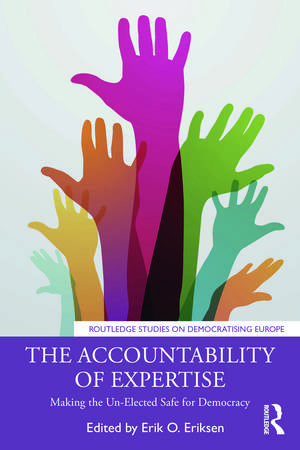The Accountability of Expertise: Making the Un-Elected Safe for Democracy: Routledge Studies on Democratising Europe
Editat de Erik O. Eriksenen Limba Engleză Paperback – 27 iul 2021
Knowledge-based decision-making is indispensable to modern democracies. This book establishes a public reason model of legitimacy and clarifies the conditions under which unelected bodies can be deemed legitimate as they are called upon to handle pandemics, financial crises, climate change and migration flows. Expert bodies are seeking neither re-election nor popularity, they can speak truth to power as well as to the citizenry at large. They are unelected, yet they wield power. How could they possibly be legitimate?
This book is of key interest to scholars and students of democracy, governance, and more broadly to political and administrative science as well as the Science Technology Studies (STS).
| Toate formatele și edițiile | Preț | Express |
|---|---|---|
| Paperback (1) | 349.97 lei 6-8 săpt. | |
| Taylor & Francis – 27 iul 2021 | 349.97 lei 6-8 săpt. | |
| Hardback (1) | 934.94 lei 6-8 săpt. | |
| Taylor & Francis – 27 iul 2021 | 934.94 lei 6-8 săpt. |
Preț: 349.97 lei
Nou
Puncte Express: 525
Preț estimativ în valută:
66.97€ • 69.09$ • 55.88£
66.97€ • 69.09$ • 55.88£
Carte tipărită la comandă
Livrare economică 26 martie-09 aprilie
Preluare comenzi: 021 569.72.76
Specificații
ISBN-13: 9781032007601
ISBN-10: 1032007605
Pagini: 216
Ilustrații: 2
Dimensiuni: 156 x 234 x 12 mm
Greutate: 0.3 kg
Ediția:1
Editura: Taylor & Francis
Colecția Routledge
Seria Routledge Studies on Democratising Europe
Locul publicării:Oxford, United Kingdom
ISBN-10: 1032007605
Pagini: 216
Ilustrații: 2
Dimensiuni: 156 x 234 x 12 mm
Greutate: 0.3 kg
Ediția:1
Editura: Taylor & Francis
Colecția Routledge
Seria Routledge Studies on Democratising Europe
Locul publicării:Oxford, United Kingdom
Public țintă
Postgraduate, Professional, and Undergraduate AdvancedCuprins
1. Introduction: Making the un-elected safe for democracy 2. Strategies for Repairing legitimacy deficits 3. Reasoned Administration: The European Union, the United States, and the project of democratic governance 4. Power, Money, Knowledge and the European Central Bank 5. Reputational Threats and Democratic Responsiveness of Regulatory Agencies 6. Accountability and Inter-institutional Respect: The case of independent regulatory agencies 7. Accountability beyond Control: How can parliamentary hearings connect the elected and the unelected? 8. Expertise and the General will in Democratic Republicanism 9. Values in Expert Reasoning: A pragmatic approach 10. Experts: From technocrats to representatives
Notă biografică
Erik O. Eriksen is Professor of Political Science and former director of ARENA, Centre for European Studies, University of Oslo, Norway.
Recenzii
"Is there a ‘legitimacy basis for the unelected’? Yes, say Erik O. Eriksen and the specialist authors in this must-read volume. In an age of scepticism about knowledge, we are reminded of the vital importance of ‘public reason’ as a basis for informed decision-making. We know that we cannot live without experts, but we also know we must legitimate expertise. This volume unlocks this conundrum, reinvigorating existing legal and institutional debates by re-asserting the political-philosophical foundations for legitimate action."
Michelle Everson, Birkbeck College, University of London, UK.
"Experts and expertise are under attack. They are needed but lost their aura of impartiality. This book offers a democratic understanding of experts by building on the reasons-giving requirement. Erik O. Eriksen, a master of the intersection between empirical and normative analysis, has gathered a set of intriguing contributions by excellent scholars. The result is a timely contribution to one of the most challenging issues for our democracies."
Michael Zürn, Berlin Social Science Center (WZB), Germany.
Michelle Everson, Birkbeck College, University of London, UK.
"Experts and expertise are under attack. They are needed but lost their aura of impartiality. This book offers a democratic understanding of experts by building on the reasons-giving requirement. Erik O. Eriksen, a master of the intersection between empirical and normative analysis, has gathered a set of intriguing contributions by excellent scholars. The result is a timely contribution to one of the most challenging issues for our democracies."
Michael Zürn, Berlin Social Science Center (WZB), Germany.
Descriere
Based on in-depth studies of the relationship between expertise and democracy in Europe, this book presents a new approach to how the un-elected can be made safe for democracy. It addresses the challenge of reconciling modern governments’ need for knowledge with the demand for democratic legitimacy.














